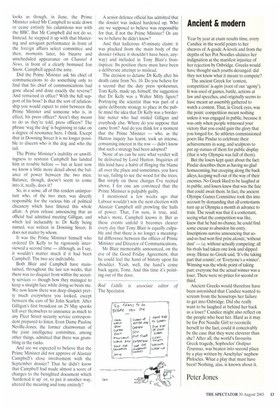Ancient & modern
Year by year at exam results time, every Candice in the world points to her sheaves of A-grade A-levels and from the depths of her Pot Noodles ululates her indignation at the manifest injustice of her rejection by Oxbridge. Greeks would have thought such youths deranged: did they not know what it meant to compete?
The ancient Greek for 'contest, competition' is agon (root of our 'agony'). It was used of games, battle, actions at law and speeches, and originally seems to have meant an assembly gathered to watch a contest. That, in Greek eyes, was the point: competition meant nothing unless it was engaged in public, because it was only when people witnessed your victory that you could gain the glory that you longed for. So athletes commissioned poets like Pindar to celebrate their achievements in song, and sculptors to put up statues of them for public display (that is why Olympia was full of them).
But the losers kept quiet about the fact: Pindar describes them as having no glad homecoming, but creeping along the back alleys, keeping well out of the way of their enemies. No Greek liked to be laughed at in public, and losers knew that was the fate that could await them. In fact, the ancient Olympic Games Committee took this into account by demanding that all contestants turn up at Olympia a month in advance to train. The result was that if a contestant, seeing what the competition was like, knew that he had no chance, he could find some excuse to abandon his entry. Inscriptions survive announcing that soand-so had won first prize akoniti, 'without dust' — i.e. without actually competing: all his rivals had taken one look and slipped away. Hence no Greek said, 'It's the taking part that counts', or 'Everyone's a winner'. Winning was the whole point of taking part; everyone but the actual winner was a loser. There were no prizes for second or third.
Ancient Greeks would therefore have been astonished that Candice wanted to scream from the housetops her failure to get into Oxbridge. Did she really want to be laughed at behind her back as a loser? Candice might also reflect on the people who beat her. Hard as it may be for Pot Noodle Girl to reconcile herself to the fact, could it conceivably be the case that they were cleverer than she? After all, the world's favourite Greek tragedy, Sophocles' Oedipus Tyrannus, was beaten into second place by a play written by Aeschylus' nephew Philocles. What a play that must have been! Nothing, alas, is known about it.
Peter Jones


























































 Previous page
Previous page